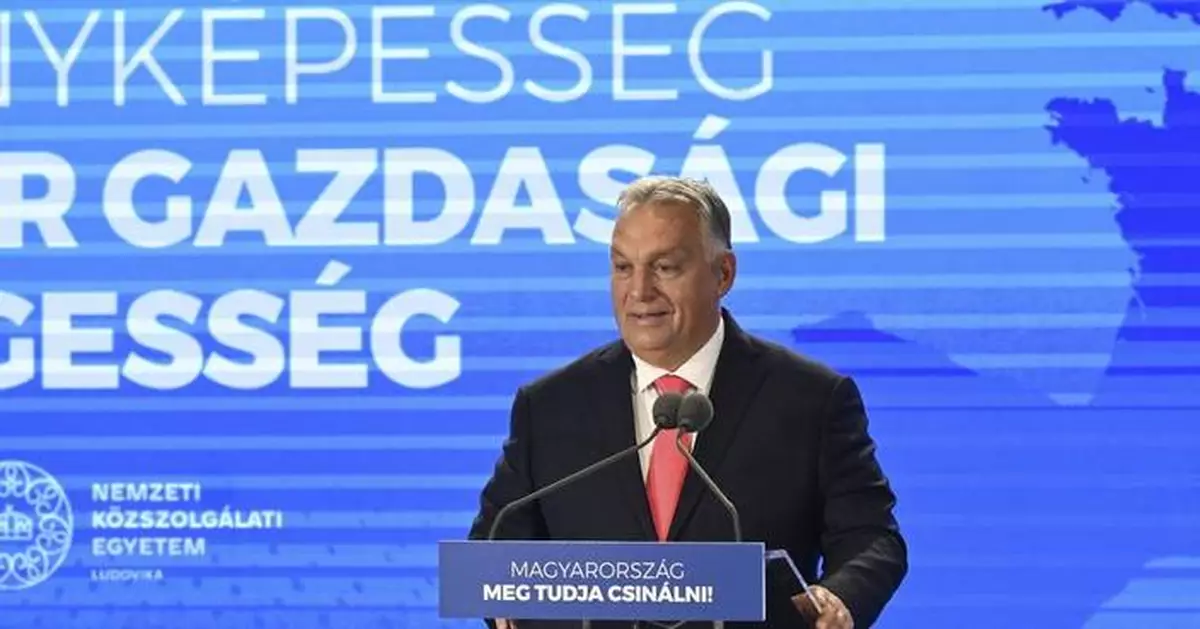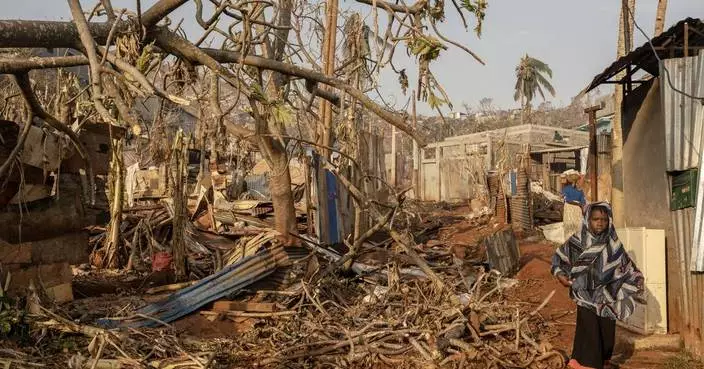BUDAPEST, Hungary (AP) — The European Union risks entering an “economic cold war” with China, Hungary's prime minister said on Friday, pledging to vote against an EU plan to impose higher tariffs on the import of Chinese electric vehicles.
EU countries are set to vote on Friday whether to finalize the tariffs, part of a broader trade dispute over Chinese government subsidies and Beijing’s burgeoning exports of green technology to the 27-nation bloc.
The tariffs are expected to pass the vote. But Hungarian Prime Minister Viktor Orbán said on Friday that his country will oppose them, and warned that Europe's tendency toward economic protectionism would destroy the EU's economy.
“What they're making us do, what the European Union is doing, is an economic cold war,” Orbán told state radio. “This is the worst thing that can happen to Europe. ... If this continues, the European economy will die,” he said.
The EU in July imposed the provisional tariffs of up to 37.6% on EVs made in China, saying they unfairly benefit from government subsidies. Beijing, in response, filed a complaint with the World Trade Organization in August, saying the tariffs violate WTO rules and undermine global cooperation on climate change.
China also launched retaliatory investigations into French cognac exports and European pork in what some analysts fear could develop into an economically harmful trade war with the EU.
Hungary under Orbán has pursued close ties with China and Russia while its Western partners increasingly seek to distance their economies from those countries. Moscow's war in Ukraine and fears that a flood of inexpensive Chinese products could disrupt Western markets have accelerated those efforts.
Meanwhile, Hungary has sought major investment from Beijing, opening a series of Chinese EV battery manufacturing plants across the country. Late last year, it announced that BYD, one of China's largest EV makers, will open its first European production factory in southern Hungary.
Orbán on Friday said that EU protectionism represented a “huge danger” to Hungary's export-oriented economy. His government has declared a policy of “economic neutrality” that favors trade with all willing countries regardless of alliances or geopolitical considerations.
He said Western partners including the EU had “attacked” Hungary over its policies in order to “divert it from the path of economic neutrality.”
“What's behind every attack is that they're trying to ... force Hungary into the bloc where they are, where I think there is no growth, no development, no future,” he said.
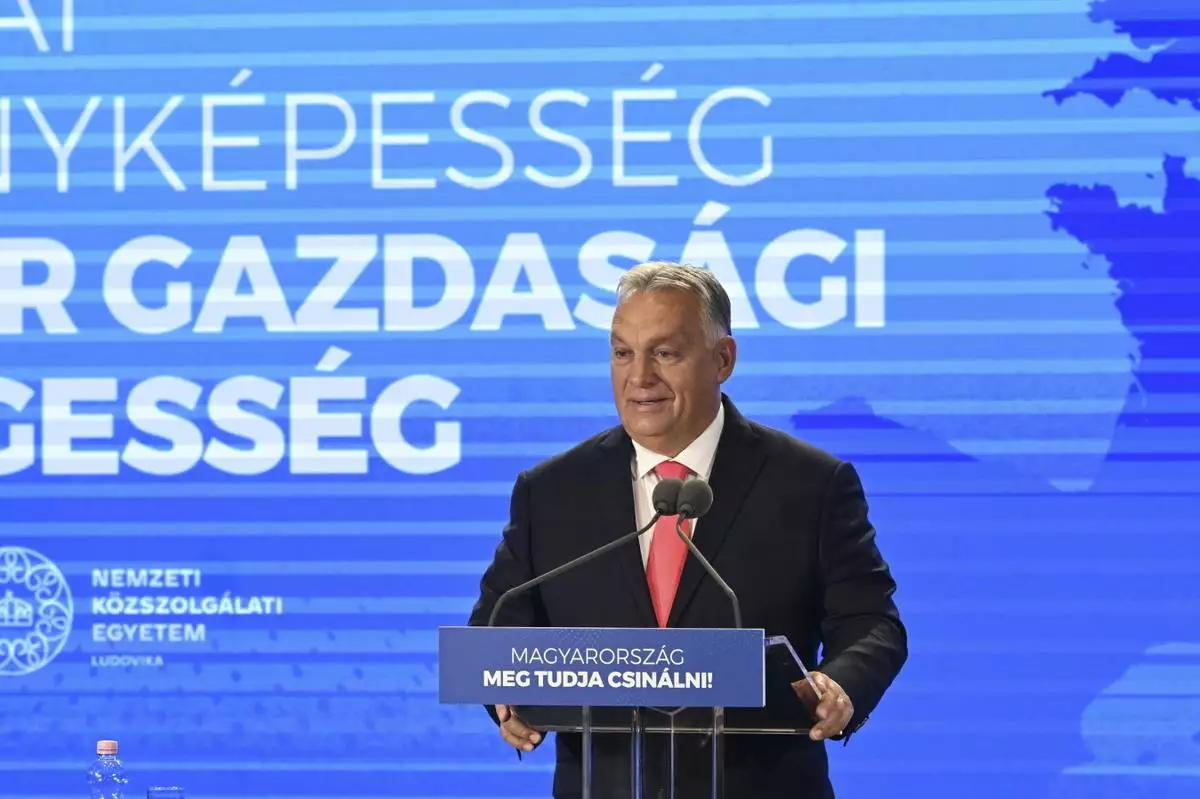
Hungarian Prime Minister Viktor Orban speaks during a conference at the Ludovika University of Public Service, in Budapest, Hungary, Wednesday, Sept. 25, 2024. (Szilard Koszticsak/MTI via AP)
TEL AVIV, Israel (AP) — A rocket fired from Yemen hit an area of Tel Aviv overnight, leaving 16 people slightly injured by shattered glass, the Israeli military said Saturday, days after Israeli airstrikes hit Houthi rebels who have been launching missiles in solidarity with Palestinians.
A further 14 people sustained minor injuries as they rushed to shelters when air raid sirens sounded before the projectile hit just before 4 a.m. Saturday, the military said.
The Houthi rebels issued a statement on the Telegram messaging app saying they had aimed a hypersonic ballistic missile at a military target, which they did not identify.
The attack comes less than two days after a series of Israeli airstrikes on Yemen’s Houthi rebel-held capital, Sanaa, and port city of Hodeida killed at least nine people. The Israeli strikes were in response to a Houthi attack in which a long-range missile hit an Israeli school building. The Houthis also claimed a drone strike targeting an unspecified military target in central Israel on Thursday.
The Israeli military says the Iran-backed Houthis have launched more than 200 missiles and drones during the Israel-Hamas war in Gaza. The Houthis have also been attacking shipping in the Red Sea and Gulf of Aden and say they won’t stop until there is a ceasefire in Gaza.
The Israeli strikes Thursday caused “considerable damage” to the Houthi-controlled Red Sea ports “that will lead to the immediate and significant reduction in port capacity,” U.N. spokesman Stephane Dujarric said. The port at Hodeida has been key for food shipments into Yemen in its decade-long civil war.
U.N. Secretary-General Antonio Guterres said both sides’ attacks risk further escalation in the region and undermine U.N. mediation efforts.
In the Gaza Strip on Saturday, mourners held the funerals of 19 people — 12 of them children — killed in Israeli strikes on Friday and overnight.
One of the strikes hit a residential building in the built-up Nuseirat refugee camp in central Gaza, killing at least seven Palestinians, including five children and one woman, and injuring 16 others, health officials said.
In Gaza City, another strike on a house overnight killed 12 people, including seven children and two women, according to Al-Ahli Hospital where the bodies were taken.
Mourners gathered at the hospital in Gaza City Saturday morning. Women comforted each other as they wept over the bodies before they were carried away. One man, stony-faced, cradled a tiny shroud-wrapped body in his arms as he carried it along the funeral procession.
In Al-Aqsa Hospital of Deir al Balah, white body bags containing those killed in Nuseirat were taken from the morgue and loaded onto the back of an open truck to be taken for burial.
Overall, Gaza's Health Ministry said Saturday that 21 people had been killed and 61 were wounded over the past 24 hours.
Israel faces heavy international criticism over the unprecedented levels of civilian casualties in Gaza and questions about whether it has done enough to prevent them.
Israel says it only strikes militants, and blames the Hamas militant group for civilian deaths because its fighters operate in residential areas.
More than 45,200 people have been killed and more than 107,500 wounded in the Gaza Strip since October 2023, when a Hamas attack in Israel killed about 1,200 people and triggered the devastating 14-month war in Gaza. Local health officials do not distinguish between civilians and combatants, but have said more than half of the fatalities are women and children.
The Israeli military organization dealing with humanitarian affairs for Gaza said Saturday it had led a “tactical coordinated operation” delivering thousands of food packages, flour and water to the Beit Hanoun area in the north of the Gaza Strip.
The organization, known by its acronym COGAT, said trucks from the U.N. World Food Program transported 2,000 food packages, 1,680 sacks of flour and thousands of liters of water to distribution centers in the area on Friday.
Aid groups have said previously that military operations and armed gangs have hindered their ability to distribute aid to civilians in need.
Gaza's Health Ministry issued an urgent appeal Saturday for medical and food supplies to be delivered to Kamal Adwan Hospital in Beit Lahia, near Beit Hanoun in northern Gaza, while the hospital director described dire conditions.
The ministry said in a statement that there was continuous gunfire and Israeli shelling near the hospital. “Shells have struck the third floor and the hospital’s entrances, creating a state of panic,” the ministry said.
Hospital Director Dr. Husam Abu Safiyeh said the facility was “facing severe shortages."
“Despite promises, we have not received the necessary supplies to maintain electricity, water, and oxygen systems," Abu Safiyeh said. "Our requests for essential medical supplies and staff have largely gone unmet.”
He said the World Health Organization had delivered 70 units of blood, but that the hospital requires at least 200 units to meet urgent needs. He said 72 wounded people were being treated at the hospital.
The shortages extend beyond medical necessities. “Food is very scarce, and we cannot provide meals for the wounded. We are urgently calling on anyone who can provide supplies to help us,” he said. “The staff is working around the clock, yet we cannot even provide meals for them.”
Shurafa reported from Deir al Balah, Gaza Strip. Associated Press writers Elena Becatoros in Majdal Shams, Golan Heights, contributed to this report.
Follow AP’s war coverage at https://apnews.com/hub/israel-hamas-war
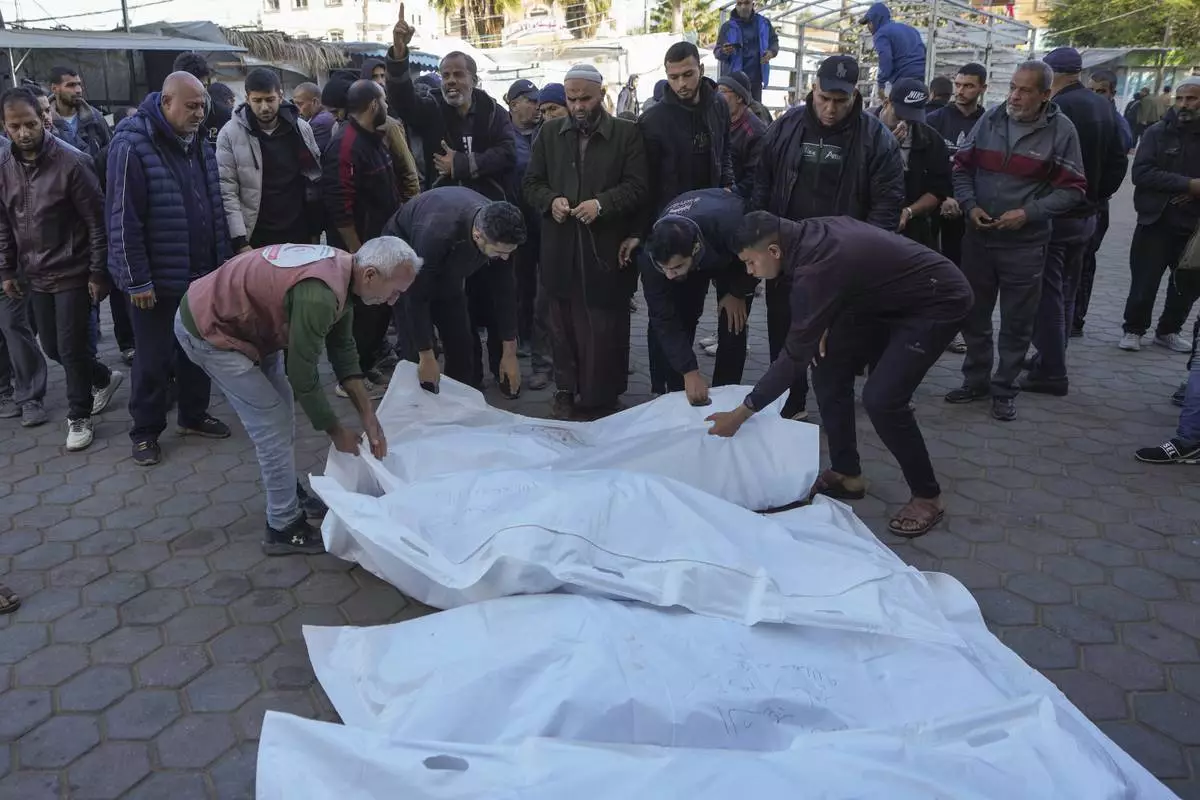
Bodies of victims of an Israeli airstrike at the Nuseirat refugee camp are prepared for the funeral prayer outside the Al-Aqsa Martyrs hospital in Deir al-Balah, Gaza Strip, Saturday, Dec. 21, 2024. (AP Photo/Abdel Kareem Hana)
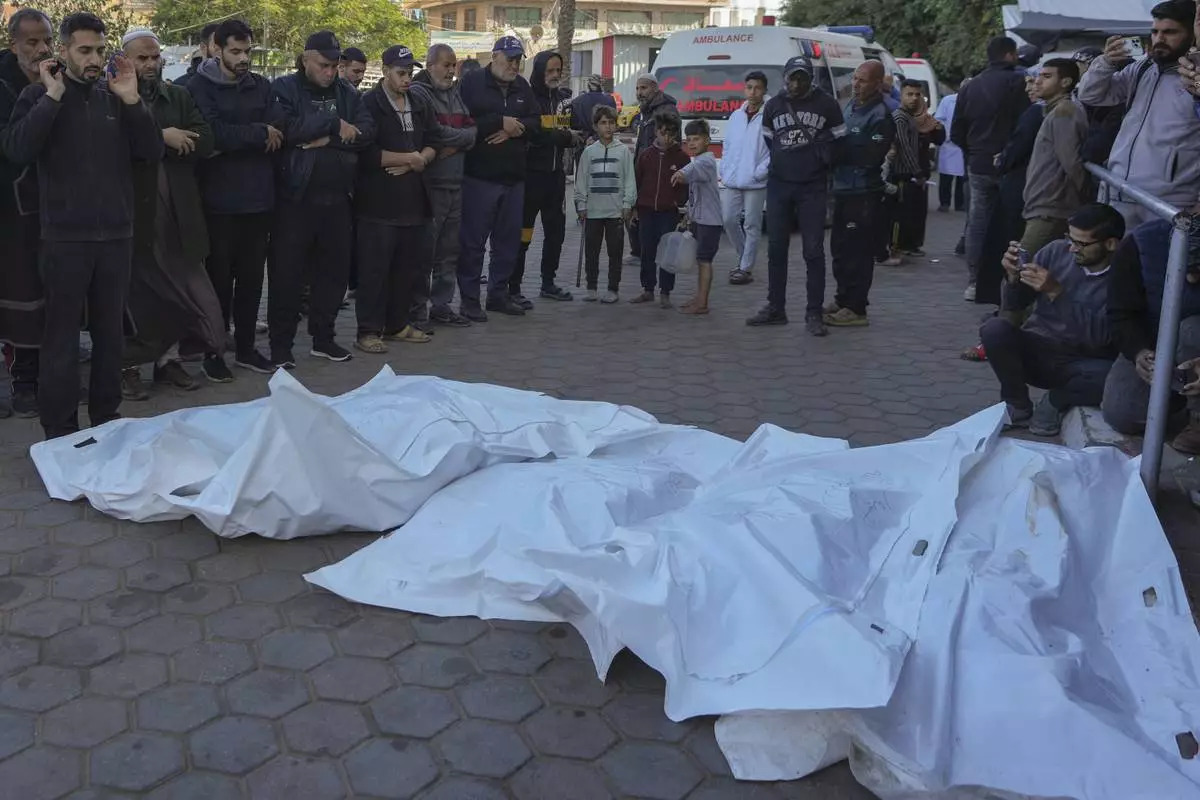
Men pray over the bodies of victims of an Israeli airstrike at the Nuseirat refugee camp during a funeral prayer outside the Al-Aqsa Martyrs hospital in Deir al-Balah, Gaza Strip, Saturday Dec. 21, 2024. (AP Photo/Abdel Kareem Hana)
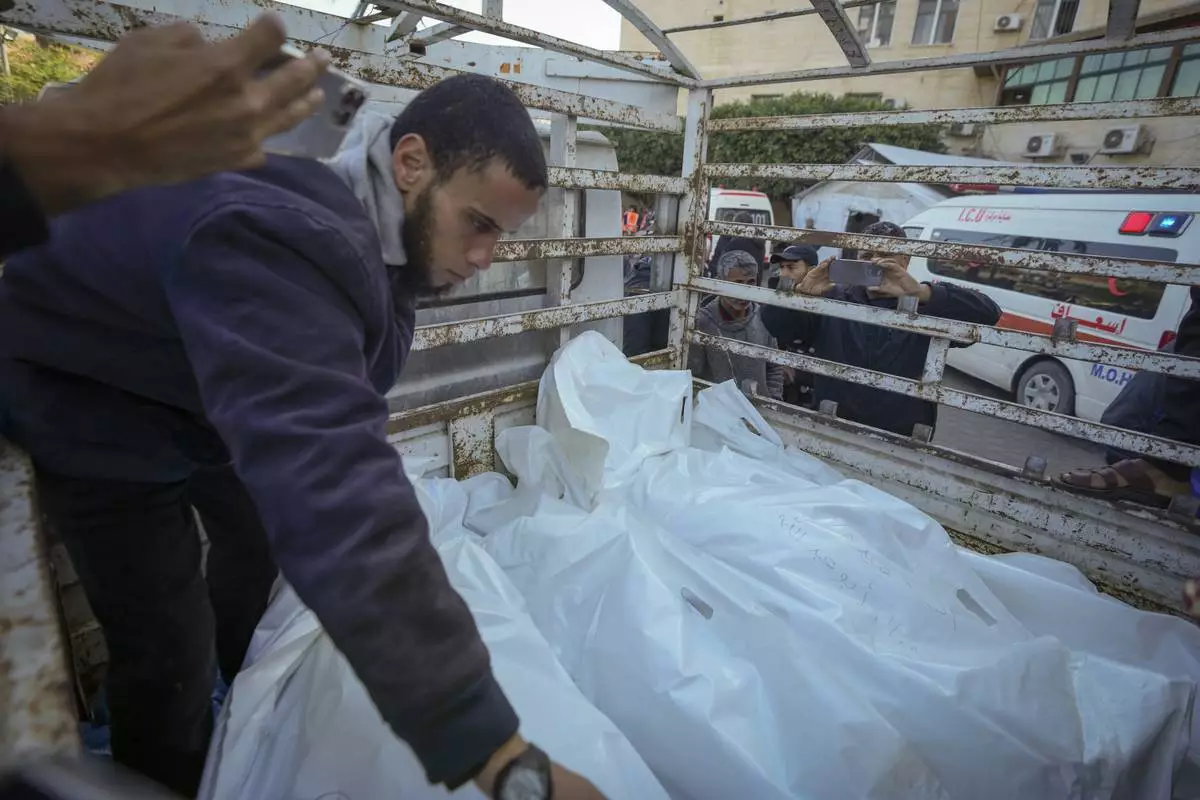
Bodies of victims of an Israeli airstrike at the Nuseirat arrive at the Al-Aqsa Martyrs hospital before their funeral in Deir al-Balah, Gaza Strip, Saturday, Dec. 21, 2024. (AP Photo/Abdel Kareem Hana)
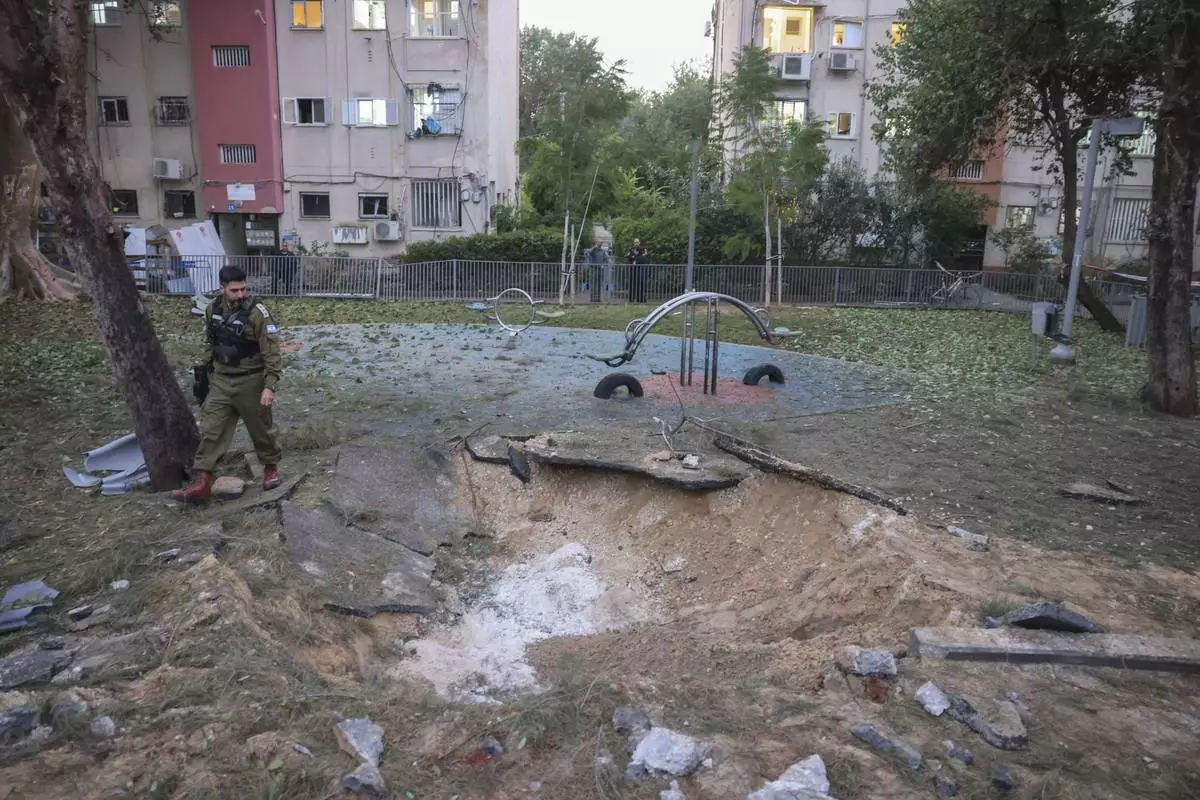
An Israeli soldier observes the site where the missile launched from Yemen landed Jaffa district, in Tel Aviv, Israel, Saturday, Dec. 21, 2024. (AP Photo/Tomer Appelbaum)



